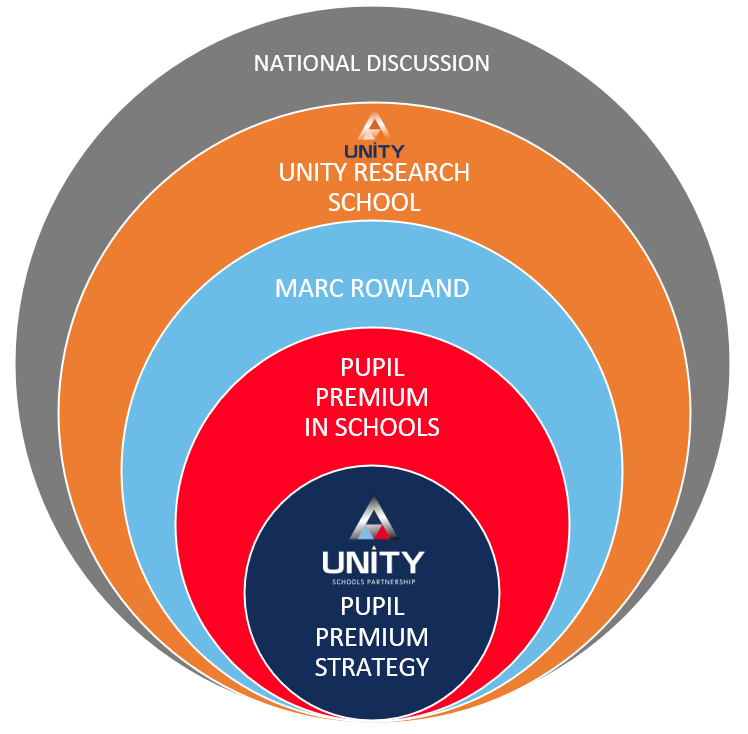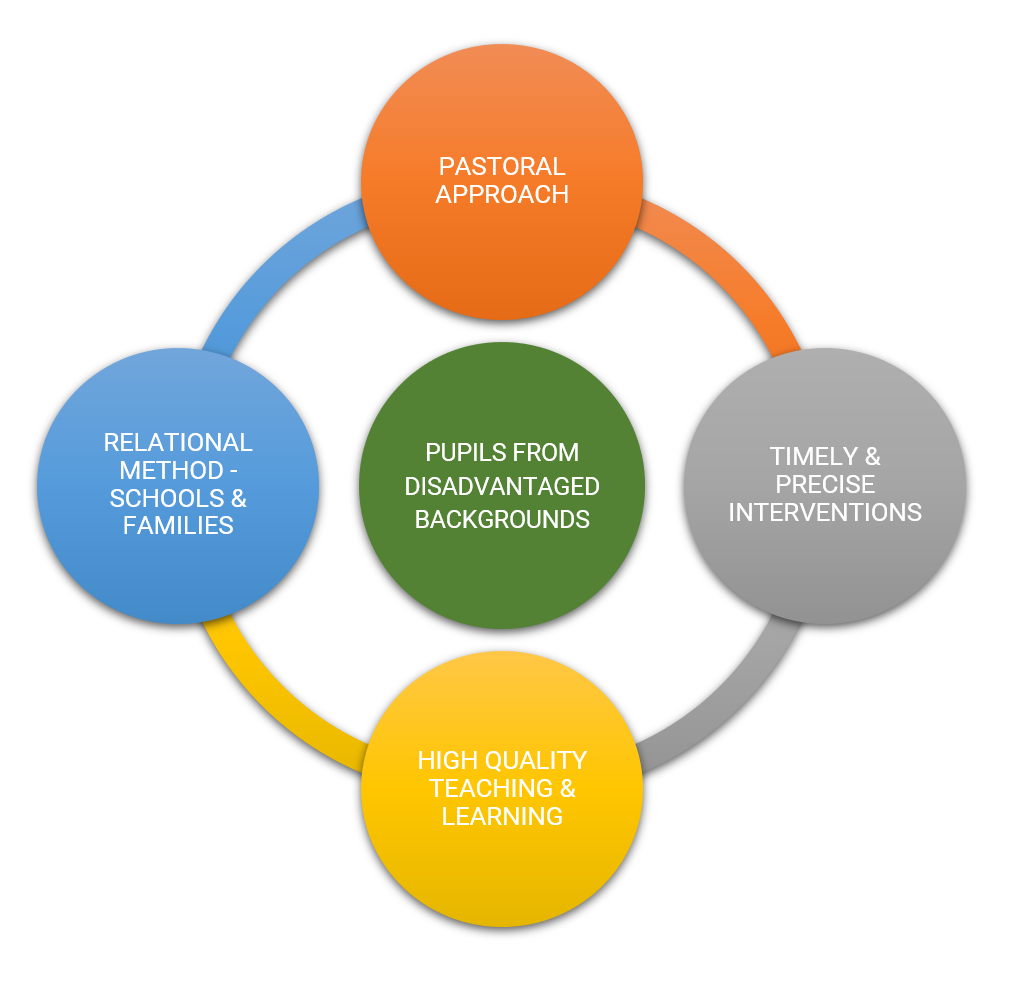Strategy & Supporting Schools
Closing the attainment gap for disadvantaged pupils is one of Unity’s main focuses. Given its importance Unity invests in and benefits from the expertise and experience of Pupil Premium expert adviser, Marc Rowland. Unity Research School (URS), also works with Marc and is instrumental in informing Unity School Partnership’s strategy, which is rooted in research evidence. The inter-related work of Unity Schools Partnership, Marc Rowland and URS means we can use evidence-informed strategies, our experience and national and international good practice. We apply these principles of good practice to our own contexts and our own pupils.
With this robust structure, we support our schools to:
- audit their provision
- benchmark against the key principles (see below)
- collaborate and share good practice in context
- share collective responsibility for the outcomes of pupils from disadvantaged backgrounds
The support structure allows schools to be reflective and responsive. This robust process requires impact-evaluation strategies to precede the implementation of plans. Marc helps each of our schools to carry out an annual audit of their provision, and holds a clinic for addressing concerns and breaking down barriers.
We do not use sweeping statements and labels; rather, we work with the pupils, and their familes, from disadvantaged backgrounds so that we understand each pupil’s needs and context. This enables us to adapt to changes and challenges so we can address these through early intervention.
Furthermore, Governors, leaders and teachers evaluate the progress of the plans to continue to adapt to changing circumstances so that all pupils can attain well.

Supporting Pupils from Disadvantaged Backgrounds
Our approach underpins our belief that every pupil, regardless of background or barrier to learning, can attain well. We work from a set of inter-related principles:
- consistently high-quality teaching and learning, which meets the pupils’ needs
- appropriately timed and precise interventions
- a pastoral perspective
- a relational approach to working with families
Consistently high-quality teaching and learning, which meets the pupil’s needs
The greatest impact comes from the quality of the pupil’s classroom experience. We aim to support the pupil in class wherever possible so that they are not withdrawn unnecessarily. This is key to promoting their:
- self-confidence
- self-esteem
- participation in learning
- confident and positive social interaction
Class teachers have the highest expectations of all pupils. Pupils are supported to work constantly to improve their personal best, which raises self-esteem and contribution.
Our schools have access to high-quality and evidence-informed professional development training, available through Unity Professional Development and Unity Research School, which provides support to ensure teaching and learning is targeted towards the pupil’s needs.
Supporting literacy is critical for success, wherever the pupils are on their attainment profile. Knowledge and retention of vocabulary, in particular, can be either a barrier to progress or accelerate it.
Appropriately-timed and precise interventions
We use interventions in a targeted way, so pupils are where they should be – participating in the classroom as much as possible.
Schools use diagnostic assessments to understand pupils’ gaps in learning. They use high-quality provision mapping to prevent over-intervention and avoid pupils being constantly withdrawn from whole-class lessons.
Interventions are used as a precise and targeted measure for closing gaps in learning, and only where this cannot be achieved in the classroom.
A pastoral perspective
Academic and pastoral strategies work in an inter-related way. It is important to understand the social, emotional and wellbeing needs of the pupils before deciding how to approach the academic needs of the pupil. This holistic approach helps the pupil to improve their self-confidence, self-regulation, metacognitive strategies, and improves their self-esteem.
A relational approach to working with families and pupils
It is important to see through the lens of the pupils and families of less fortunate backgrounds to understand their needs and context. Every family is different and requires a bespoke approach. What we learn informs teaching and learning and social, emotional and wellbeing support strategies.
We aim to foster positive, consistent relationships throughout.

What is Pupil Premium?
Purpose
Pupil premium funding is extra funding given to publicly-funded schools in England, to help them improve the attainment of their pupils from disadvantaged backgrounds.
Evidence shows that children from disadvantaged backgrounds:
- generally face extra challenges in reaching their potential at school
- often do not perform as well as their peers
The pupil premium grant is designed to allow schools to help disadvantaged pupils by improving their progress and the exam results they achieve.
Academically Able
The pupil premium is not based on ability.
Research shows that the most academically able pupils from disadvantaged backgrounds are most at risk of under-performing. Schools should focus on these pupils just as much as less academically able pupils.
Use of the Pupil Premium Funding
Tiered approach
Evidence suggests that pupil premium spending is most effective when schools use a tiered approach, targeting spending across the three areas below, but focusing on teaching quality – investing in learning and development for teachers.
Read the pupil premium guide from the Education and Endowment Foundation (EEF) for information about the tiered approach to spending.
Teaching
Schools arrange training and professional development for all their staff to improve the impact of teaching and learning for pupils.
Academic support
Schools should decide on the main issues that stop their pupils from succeeding at school and use the Pupil Premium to buy extra help.
Wider approaches
This may include non-academic use of the Pupil Premium such as:
– school breakfast clubs
– music lessons for disadvantaged pupils
– help with the cost of educational trips or visits
– speech and language therapy
Schools may find using the Pupil Premium in this way helps to:
- increase pupils’ confidence and resilience
- encourage pupils to be more aspirational
- benefit non-eligible pupils
Please visit the Government’s website on Pupil Premium for more detailed information on Pupil Premium Funding and ways in which it can be used.
Marc Rowland – Unity’s Pupil Premium Adviser
Marc is the adviser for improving outcomes for disadvantaged learners for the Unity Schools Partnership.
Marc is currently working with the Education Endowment Foundation’s Research School Network on the roll out of their national Pupil Premium training programme. He is also working, country-wide, on a range of programmes focused on educational disadvantage. Marc was formerly the Head of Rosendale Research School in Lambeth.
Marc has also been working with the Jersey government for four years on the introduction and implementation of a ‘Jersey Pupil Premium’. This has led to a marked improvement in outcomes for disadvantaged pupils there.
Marc is also the co-author of the Essex LA funded Pupil Premium self-evaluation toolkit. He has worked / is working with North Yorkshire, Essex, Sheffield, Hampshire, Suffolk, Swindon, Warwickshire, Gloucestershire, South Gloucestershire, Stoke on Trent, East Sussex and other LAs, numerous Multi Academy Trusts, Teaching School Alliances and groups of schools nationally on long-term projects to support better outcomes for disadvantaged pupils. Most recently, he led a review of the use and impact of Pupil Premium in the Oldham and Derby Opportunity Areas, and in East Sussex Local Authority (to be published in May 2020).
Marc has also worked with the Department for Education and over 500 individual schools to support them with their strategies to improve outcomes for disadvantaged pupils. He has spoken to approximately 10,000 school leaders at conferences on Pupil Premium, from Northumberland to Cornwall. Over the past five years, Marc has worked with Rosendale Research School on two major school-based research projects on Lesson Study and Metacognition – the latter being a large scale Randomised Controlled Trial (RCT) funded by the EEF.
The second edition of Marc’s award-winning book, ‘An Updated Practical Guide to the Pupil Premium’, was published in December 2015 (John Catt Educational). His latest book ‘Learning without Labels’ was also published by John Catt in March 2017. Marc has also contributed to a number of other publications, such as ‘The Forgotten Third’, edited by Roy Blatchford CBE, ‘Great Expectations’, edited by David Bartram OBE, and ‘Spotlight on Disadvantage’ from the National Governors Association.
Marc is an education adviser to the Driftwood Association, a charitable association funding small scale projects in Nepal, and was also Director of Policy and Research for the National Education Trust from 2007 to 2017.

